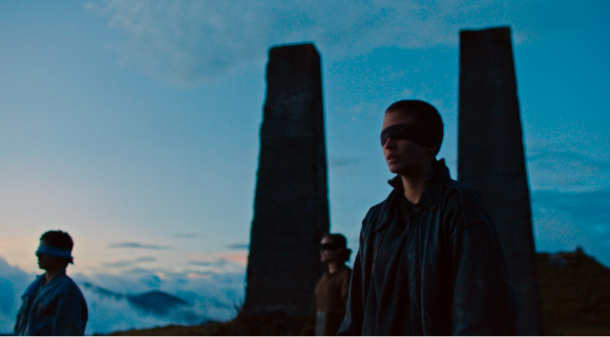Yalitza Aparicio’s joining The Academy…
The Academy of Motion Picture Arts & Sciences has released its annual list of invitations to join the organization, with the 26-year-old Mexican actress and UNESCO Goodwill Ambassador for Indigenous Peoples among the 819 extended an invite.

Aparicio, one of Time magazine’s100 most influential people in the world in 2019,earned an Oscar nod in the Best Actress category for her performance in Alfonso Cuarón‘s 2018 Spanish-language drama Roma. With the nomination for her actig debut, she became the first Indigenous American woman and the second Mexican woman to receive a Best Actress Oscar nomination.
But Aparcio isn’t the only Latino/a to make the list…
Other invitees in the Actors branch include Bobby Cannavale, who appeared in The Irishman, Overboard’s Eva Longoria, Knives Out star Ana de Armas and Gringo actor Yul Vazquez.
Invitees in the Music branch include Andrea Guerra (Hotel Rwanda) and Cuban-American jazz trumpeter Arturo Sandoval, who worked on the music for Clint Eastwood’s films Richard Jewell and The Mule.
The Directors branch sent out invitations to Latino filmmakers Icíar Bolláin (Spanish), Felipe Cazals (Mexican), Sebastián Cordero (Ecuadorian), Luis Estrada (Mexican), Alejandro Landes (Colombian-Ecuadorian),Jorge Alí Triana (Colombian) and Andrés Wood (Chilean).
This year’s new class demonstrates The Academy’s commitment to erasing the stigma of not being inclusive, particularly in terms of women, international members and underrepresented ethnic/racial communities.
The organization reports this year’s class breakdown is 49% international, 45% women, and 36% underrepresented ethnic/racial.
The overwhelming number of those invited to join the Academy end up accepting.
The total active membership in 2019 was 8,946, with 8,733 eligible to vote. Total membership including active, voting and retired was 9,794. Today’s additions will take the membership count past the 10,000 mark.
AMPAS says members can voluntarily disclose their race/ethnicity, sex or can choose “prefer not to.” So, demo stats may not be 100% accurate. AMPAS also “recognizes and respects” the personal choice in identification, but doesn’t track LGBTQ+ or differently abled, although a source says, while protecting privacy and not forcing answers, they are “working towards it.” In other words this is no longer your father’s Academy.
“We take great pride in the strides we have made in exceeding our initial inclusion goals set back in 2016, but acknowledge the road ahead is a long one,” said Academy CEO Dawn Hudson. “We are committed to staying the course.”
“The Academy is delighted to welcome these distinguished fellow travelers in the motion picture arts and sciences. We have always embraced extraordinary talent that reflects the rich variety of our global film community, and never more so than now,” said Academy President David Rubin.
Here’s a look at some of this year’s Latino invitees:
Actors
Yalitza Aparicio – “Roma”
Bobby Cannavale – “The Irishman,” “The Station Agent”
Ana de Armas – “Knives Out,” “Blade Runner 2049”
Eva Longoria – “Overboard,” “Harsh Times”
Yul Vazquez – “Gringo,” “Last Flag Flying”
Casting Directors
Libia Batista – “Eres Tú Papá?,” “Viva”
Javier Braier – “The Two Popes,” “Wild Tales”
Eva Leira – “Pain and Glory,” “Biutiful”
Yesi Ramirez – “The Hate U Give,” “Moonlight”
Yolanda Serrano – “Pain and Glory,” “Biutiful”
Cinematographers
Óscar Faura – “Jurassic World: Fallen Kingdom,” “The Imitation Game”
Directors
Icíar Bolláin – “Even the Rain,” “Take My Eyes”
Felipe Cazals – “El Año de la Peste,” “Canoa: A Shameful Memory”
Sebastián Cordero – “Europa Report,” “Crónicas”
Luis Estrada – “The Perfect Dictatorship,” “Herod’s Law”
Alejandro Landes – “Monos,” “Porfirio”
Jorge Alí Triana – “Bolívar Soy Yo,” “A Time to Die”
Andrés Wood – “Araña,” “Violeta Went to Heaven”
Documentary
Cristina Amaral – “Um Filme de Verão (A Summer Film),” “Person”
Violeta Ayala – “Cocaine Prison,” “The Bolivian Case”
Julia Bacha – “Naila and the Uprising,” “Budrus”
Almudena Carracedo – “The Silence of Others,” “Made in L.A.”
Paola Castillo – “Beyond My Grandfather Allende,” “Genoveva”
Paz Encina – “Memory Exercises,” “Paraguayan Hammock”
Mariana Oliva – “The Edge of Democracy,” “Piripkura”
Iván Osnovikoff – “Los Reyes,” “La Muerte de Pinochet (The Death of Pinochet)”
Tiago Pavan – “The Edge of Democracy,” “Olmo and the Seagull”
Bettina Perut – “Los Reyes,” “La Muerte de Pinochet (The Death of Pinochet)”
Marta Rodriguez – “Our Voice of Earth, Memory and Future,” “Campesinos (Peasants)”
Executives
Ozzie Areu
Barbara Peiro
Frank Rodriguez
Mimi Valdes
Film Editors
Alejandro Carrillo Penovi – “Heroic Losers,” “The Clan”
Alex Marquez – “Snowden,” “Savages”
Makeup Artists and Hairstylists
Mari Paz Robles – “I Dream in Another Language,” “Cantinflas”
David Ruiz Gameros – “Tear This Heart Out,” “Amores Perros”
Susana Sánchez – “The Liberator,” “Goya’s Ghosts”
Marketing and Public Relations
Inma Carbajal-Fogel
Emmanuelle Castro
Fernando Garcia
Dustin M. Sandoval
Music
Andrea Guerra – “The Pursuit of Happyness,” “Hotel Rwanda”
Arturo Sandoval – “Richard Jewell,” “The Mule”
Producers
Edher Campos – “Sonora, the Devil’s Highway,” “The Golden Dream”
Nicolas Celis – “Roma,” “Tempestad”
Alex Garcia – “Kong: Skull Island,” “Desierto”
Enrique López Lavigne – “The Impossible,” “Sex and Lucia”
Álvaro Longoria – “Everybody Knows,” “Finding Altamira”
Mónica Lozano – “I Dream in Another Language,” “Instructions Not Included”
Gabriela Maire – “Las Niñas Bien (The Good Girls),” “La Caridad (Charity)”
Luis Manso – “Champions,” “Binta and the Great
Gabriela Rodríguez – “Roma,” “Gravity”
Mar Targarona – “Secuestro (Boy Missing),” “The Orphanage”
Luis Urbano – “Letters from War,” “Tabu”
Production Design
Sandra Cabriada – “Instructions Not Included,” “The Mexican”
Estefanía Larraín – “A Fantastic Woman,” “Neruda”
Short Films and Feature Animation
José David Figueroa García – “Perfidia,” “Ratitas”
Oscar Grillo – “Monsters, Inc.,” “Monsieur Pett”
Otto Guerra – “City of Pirates,” “Wood & Stock: Sexo, Orégano e Rock’n’Roll”
Isabel Herguera – “Winter Love,” “Under the Pillow”
Summer Joy Main-Muñoz – “Don’t Say No,” “La Cerca”
Juan Pablo Zaramella – “Luminaris,” “The Glove”
Sound
David Esparza – “The Magnificent Seven,” “The Equalizer”
Visual Effects
Leandro Estebecorena – “The Irishman,” “Kong: Skull Island”
Members-at-Large
Daniel Molina
Carlos Morales
Jesse Torres





